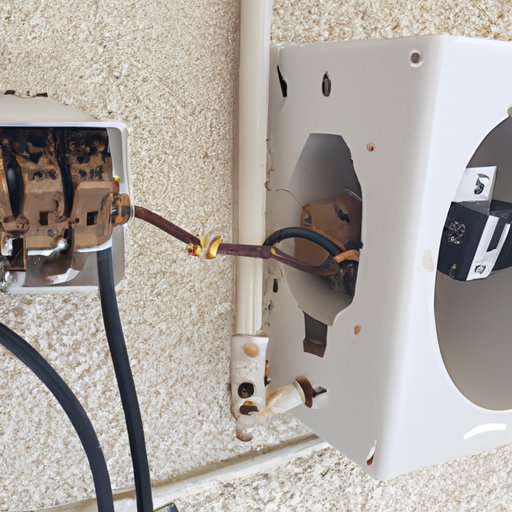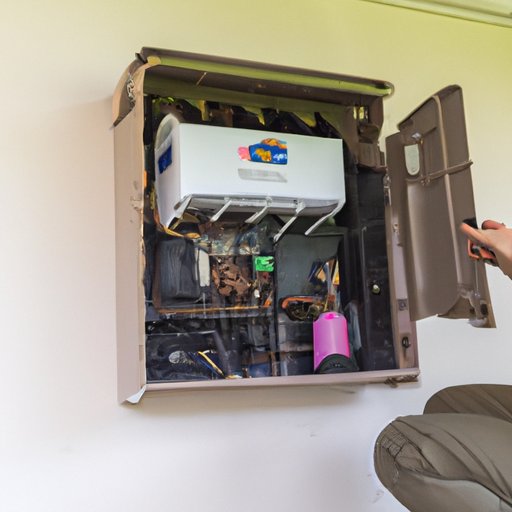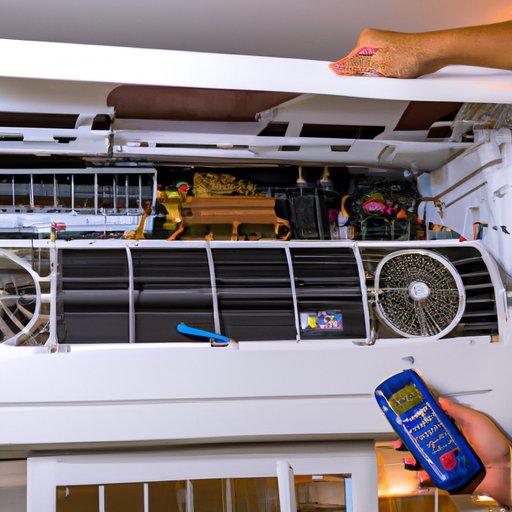Introduction
Air conditioners are essential during the hot summer months. But if your air conditioning unit keeps tripping the breaker, it can be incredibly frustrating. In this article, we will explore what causes an AC unit to trip the breaker, how to troubleshoot and fix the issue, and preventive measures to take to avoid the problem.
What is an AC Unit Tripping a Breaker?
When an AC unit trips the breaker, it means that the electrical current running through the unit has exceeded the safety limits of the circuit. This can cause the breaker switch to shut off power to the unit. It’s important to note that some AC units may have a separate breaker switch, while others may be connected to the main breaker.
Overview of Common Causes
There are several common causes for an AC unit tripping the breaker. These include:
- A short circuit caused by worn wiring or loose connections
- Overloaded circuits caused by too many appliances being plugged into the same circuit
- Faulty circuit breakers
- Malfunctioning thermostats
- Dirty filters
- Low refrigerant levels
Troubleshooting and Fixing an AC Unit That Keeps Tripping a Breaker
If your AC unit keeps tripping the breaker, you will need to troubleshoot and fix the issue as soon as possible. Here are some tips to help you find the source of the problem and resolve it quickly.
Tips for Locating the Source of the Problem
The first step in troubleshooting an AC unit that keeps tripping the breaker is to locate the source of the problem. If you suspect a short circuit, you should check the wiring and connections for any signs of wear or damage. You should also check for overloaded circuits, faulty circuit breakers, malfunctioning thermostats, dirty filters, and low refrigerant levels.
Advice on How to Resolve the Issue
Once you have located the source of the problem, you can begin to resolve it. In the case of a short circuit, you should repair or replace any worn wiring or loose connections. If you suspect an overloaded circuit, you should unplug any unnecessary appliances or move them to a different circuit. If the problem is a faulty circuit breaker, you should replace it with a new one. For malfunctioning thermostats, you should adjust the settings or replace the thermostat. Dirty filters should be cleaned or replaced. And finally, if the refrigerant levels are low, you should contact a professional to top up the refrigerant.

When to Hire a Professional
In some cases, it may be best to hire a professional to resolve the issue. This is especially true if the problem is related to the refrigerant levels, as topping up the refrigerant requires specialized knowledge and equipment.
Overview of What to Expect
When you hire a professional, you can expect them to inspect the unit and diagnose the problem. They will then provide you with a quote for the repair work, which may include parts and labor costs. Once you approve the quote, they will proceed with the repairs.
Benefits of Professional Service
The main benefit of hiring a professional is that they have the expertise and equipment to identify and fix the issue quickly and correctly. This helps to ensure that the problem is resolved and that the AC unit is operating safely and efficiently.

DIY Solutions for an AC Unit Tripping a Breaker
If you prefer to tackle the problem yourself, there are some DIY solutions you can try. However, it’s important to note that these solutions may not always be successful and could potentially make the problem worse.
Steps for Troubleshooting and Fixing
When attempting DIY repairs, you should first turn off the power to the AC unit. You should then inspect the wiring and connections for any signs of wear or damage. You should also check for overloaded circuits, faulty circuit breakers, malfunctioning thermostats, dirty filters, and low refrigerant levels. Depending on the problem, you may be able to resolve it yourself by repairing or replacing the faulty parts.
Pros and Cons of DIY Repairs
The main advantage of attempting DIY repairs is that it can save you money. However, it can also be time consuming and there is a risk of making the problem worse. Additionally, if the problem is related to the refrigerant levels, you should not attempt to top up the refrigerant yourself, as this requires specialized knowledge and equipment.

Regular Maintenance to Prevent AC Unit Tripping a Breaker
The best way to avoid an AC unit tripping the breaker is to perform regular maintenance. Regular maintenance helps to ensure that the unit is operating properly and that any potential problems are caught early.
Tips for Proper Maintenance
To keep your AC unit in good working order, you should inspect the wiring and connections annually. You should also check the circuit breakers, thermostats, filters, and refrigerant levels regularly. Additionally, you should clean the unit and its components regularly to keep it running smoothly.
Benefits of Regular Maintenance
The main benefit of regular maintenance is that it helps to extend the life of the AC unit and reduce the risk of it tripping the breaker. Regular maintenance also helps to ensure that the unit is operating efficiently, which can help to lower your energy bills.
Conclusion
An AC unit tripping the breaker can be a frustrating problem. Fortunately, there are steps you can take to troubleshoot and fix the issue. If the problem is related to the refrigerant levels, you should hire a professional to resolve it. Additionally, regular maintenance can help to reduce the risk of the AC unit tripping the breaker.
(Note: Is this article not meeting your expectations? Do you have knowledge or insights to share? Unlock new opportunities and expand your reach by joining our authors team. Click Registration to join us and share your expertise with our readers.)
